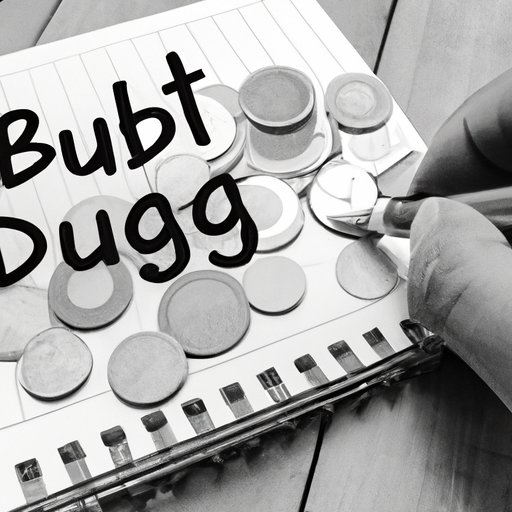Introduction
Managing your finances wisely is essential in order to ensure that you have enough money to cover all of your necessary expenses and still be able to save for the future. It involves understanding how much money you have coming in each month and how much you are spending. It also involves setting up a budget and sticking to it, saving money in an emergency fund, automating your savings, tracking your expenses, and taking advantage of tax breaks.

Creating a Budget and Sticking to It
The first step in managing your finances wisely is to create a budget and stick to it. A budget allows you to see where your money is going and helps you make informed decisions about how to best use your money. When creating a budget, it is important to include all of your income and expenses, such as rent, utilities, food, car payments, insurance, and any other expenses you may have.
When creating a budget, it is important to be realistic and honest with yourself. You should also factor in any unexpected expenses that may arise, such as medical bills or car repairs. It is also important to set aside some money for fun activities and entertainment. Once you have created your budget, it is important to stick to it. Here are some tips for sticking to your budget:
- Make sure your budget is realistic and manageable.
- Set specific goals and reward yourself when you reach them.
- Track your spending and review your budget regularly.
- Avoid impulse purchases and find cheaper alternatives.
- Have an accountability partner who will help keep you on track.

Saving Money in an Emergency Fund
Having an emergency fund is an important part of managing your finances wisely. An emergency fund is a set amount of money that is saved in case of an unexpected financial crisis. It can help you avoid having to take out loans or rack up credit card debt if you are faced with an unexpected expense. It is important to have at least three to six months’ worth of living expenses saved in an emergency fund.
When saving for an emergency fund, it is important to choose a safe place to store the money. A high-yield savings account is usually the best option. This type of account typically offers a higher interest rate than a regular savings account, so the money will grow faster. Another option is to invest the money in a low-risk investment like a bond or certificate of deposit (CD).
It is also important to decide how much money to save in an emergency fund. As mentioned, it is recommended to have at least three to six months’ worth of living expenses saved, but this amount may vary depending on your individual situation. For example, if you are self-employed or have unstable income, you may want to save more. On the other hand, if you are employed by a company with good job security, you may not need to save as much.
Automating Your Savings
Automating your savings is another effective way to manage your finances wisely. Automating your savings means setting up a system where a certain amount of money is automatically transferred from your checking account into a savings account on a regular basis. This is a great way to ensure that you are consistently saving money without having to think about it. There are several different ways to automate your savings, such as setting up automatic transfers from your checking account to a savings account, setting up automatic deposits from your paycheck to a savings account, or signing up for a savings app that automatically transfers a certain amount of money from your checking account to a savings account.
Tracking Your Expenses
Tracking your expenses is another important step in managing your finances wisely. Tracking your expenses allows you to see exactly where your money is going and helps you identify areas where you can cut back. There are several different ways to track your expenses, such as using a spreadsheet, writing down your expenses in a notebook, or using a budgeting app. Whichever method you choose, it is important to track all of your expenses, including both fixed expenses (e.g. rent) and variable expenses (e.g. groceries).
Taking Advantage of Tax Breaks and Deductions
Tax breaks and deductions are another great way to manage your finances wisely. Tax breaks and deductions reduce your taxable income, which can help lower your overall tax bill. Common tax breaks and deductions include deductions for charitable donations, home office expenses, medical expenses, student loan interest, and retirement contributions. To take advantage of these tax breaks and deductions, you must itemize your deductions on your tax return.
Conclusion
Managing your finances wisely is essential in order to ensure that you have enough money to cover all of your necessary expenses and still be able to save for the future. It involves understanding how much money you have coming in each month and how much you are spending, creating a budget and sticking to it, saving money in an emergency fund, automating your savings, tracking your expenses, and taking advantage of tax breaks and deductions. By following these steps, you can ensure that you are making the most of your money and setting yourself up for financial success.
(Note: Is this article not meeting your expectations? Do you have knowledge or insights to share? Unlock new opportunities and expand your reach by joining our authors team. Click Registration to join us and share your expertise with our readers.)
